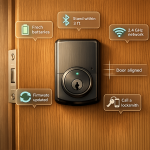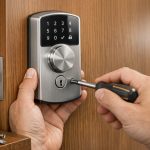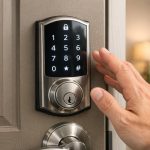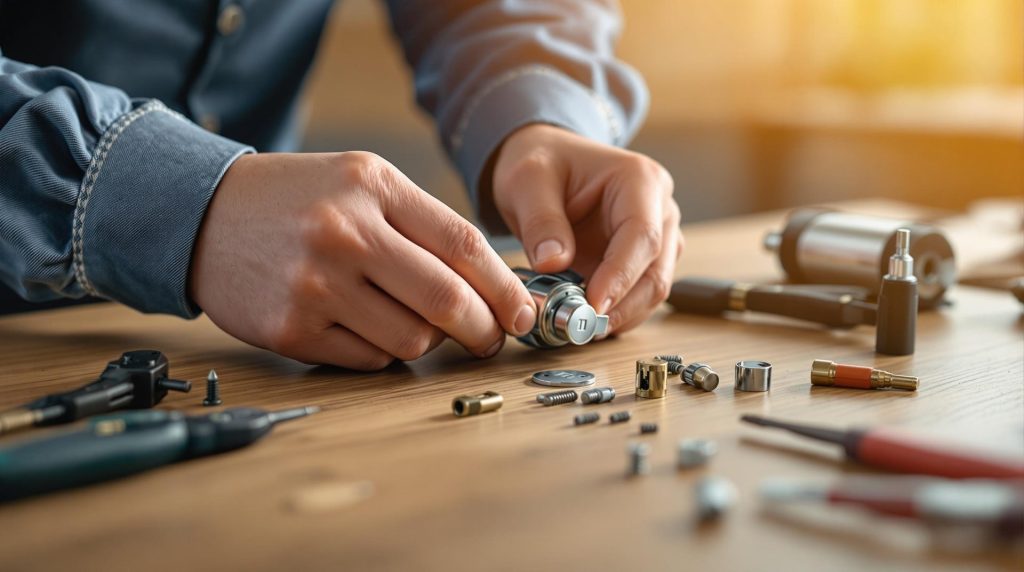When your lock malfunctions, should you fix it yourself or hire a locksmith? The answer depends on the problem, your skills, and the lock’s importance. DIY is great for simple fixes like lubricating a sticky lock or tightening screws, but complex issues – like broken keys, smart lock malfunctions, or rekeying – are better left to professionals. Here’s a quick breakdown:
- DIY Pros: Saves money, builds skills, and works for minor issues like cleaning keyholes or replacing basic hardware.
- DIY Cons: Risk of damage, voided warranties, and security vulnerabilities if done incorrectly.
- Professional Pros: Expertise, proper tools, and reliable results for advanced or critical repairs.
- Professional Cons: Higher costs and potential scheduling delays.
Quick Tip: If the lock secures a main entry point or involves electronics, call a locksmith. For minor, non-critical issues, DIY can work if you’re confident in your abilities.
Quick Comparison:
| Criteria | DIY Repairs | Professional Repairs |
|---|---|---|
| Cost | Low upfront, but risk of costly errors | Higher upfront, but includes warranties |
| Time | Can take longer due to learning curve | Quick and efficient |
| Risk | Higher risk of mistakes | Minimal risk with expert handling |
| Tools Needed | Basic tools for simple tasks | Specialized tools for complex issues |
| Best For | Minor fixes (e.g., lubrication, cleaning) | Critical or advanced repairs |
For critical security and peace of mind, professionals like Sherlock’s Locksmith in Pittsburgh, PA, offer 24/7 service for residential, commercial, and automotive needs.
Locksmith Vs DIY: When to Call a Professional
DIY Lock Repairs
Taking on DIY lock repairs can be a satisfying experience, but it’s important to recognize your limits. While some tasks are simple enough for most homeowners to handle, others are best left to professionals. Let’s look at some common repairs you can tackle yourself and the potential risks involved.
Tasks You Can Do Yourself
There are several straightforward lock-related tasks that don’t require professional expertise:
- Basic maintenance: If a lock feels sticky, a quick fix is to apply graphite powder or a light lubricant like WD-40 to the keyway. Insert and turn the key a few times to distribute the lubricant evenly.
- Tightening loose screws: Loose screws on door handles, strike plates, or hinges can cause alignment problems. A screwdriver is all you need to tighten them and keep everything secure.
- Cleaning keyholes: Dust and debris can build up inside locks, leading to jams. Use compressed air or a small brush to clear out any obstructions.
- Adjusting strike plates: When a door won’t latch properly, repositioning the strike plate can often solve the issue. Remove the plate, fill the old screw holes with wood filler, and reinstall it in the correct position.
- Replacing basic hardware: Swapping out doorknobs or simple deadbolts is usually straightforward. Just make sure the new hardware matches the existing measurements for an easy fit.
Benefits of DIY Lock Repairs
Taking a do-it-yourself approach to lock repairs comes with several perks:
- Save time and money: You can address minor issues on your own schedule without paying for professional services.
- Learn valuable skills: Understanding how locks work boosts your confidence and helps you spot potential problems early.
- Personal satisfaction: Successfully completing a repair not only improves your home’s upkeep but also gives you a sense of accomplishment.
Drawbacks and Risks of DIY
While DIY repairs have their advantages, they also come with some risks:
- Security concerns: If a repair isn’t done correctly, it could leave your home vulnerable to intruders.
- Unintended damage: A simple fix can escalate into a bigger problem if parts are mishandled, potentially leading to a full lock replacement.
- Voided warranties: Many lock manufacturers won’t honor warranties if unauthorized repairs are attempted, leaving you to cover the cost of any future issues.
- Injury risks: Working with tools and small components can lead to cuts, scrapes, or more serious injuries, especially if you’re unfamiliar with the process.
- Time investment: What seems like a quick job can turn into a lengthy project if you need additional tools or parts.
Modern locks, especially smart locks, often include complex mechanisms that require precise alignment or specialized knowledge. Attempting to repair these without the right skills can lead to costly mistakes, including the need for emergency professional repairs. In some cases, the risks and potential costs might outweigh the initial savings, making it wiser to call in an expert when in doubt.
Professional Lock Repairs
When locks go beyond basic maintenance and start causing trouble, it’s time to call in the professionals. Skilled locksmiths not only solve the problem but also ensure your security is intact, saving you from future headaches and expenses.
Tasks That Need Professional Help
Some lock-related issues simply demand professional expertise. For instance, emergency lockouts often require immediate attention, and locksmiths are equipped to handle these situations quickly – even during late hours or harsh weather conditions.
High-tech systems like smart locks and keyless entry setups also fall into the “leave it to the pros” category. These systems involve intricate wiring, software configuration, and integration with existing security networks. A professional locksmith ensures proper installation and programming, so everything works seamlessly.
If your lock jams, a key breaks off inside, or internal mechanisms fail, a professional can diagnose the problem, assess whether parts are salvageable, and determine if replacements are necessary. These situations often require tools and expertise beyond what most people have at home.
Moving into a new home? Rekeying is essential to ensure that only you have access. Locksmiths can rekey locks or upgrade your security system, eliminating the risk of someone else having a spare key. For businesses, they can also design master-key systems and install security solutions tailored to high-traffic environments.
Commercial properties, in particular, demand specialized attention. A professional locksmith can create systems that protect both assets and employees while ensuring compliance with safety standards.
These scenarios highlight why professional locksmiths are indispensable when it comes to more complex lock and security challenges.
Benefits of Hiring a Professional Locksmith
Professional locksmiths bring a wealth of experience and training to the table, allowing them to solve problems efficiently and accurately. Their ability to pinpoint the root cause of an issue ensures lasting solutions rather than temporary fixes.
They also have access to advanced tools that most homeowners don’t. These tools enable precise repairs without causing additional damage to surrounding components. Plus, many locksmiths provide warranties on their work, offering peace of mind that the job was done right.
Another advantage is the quality of materials used. Professionals often rely on trusted manufacturers, ensuring better performance and durability compared to cheaper, generic products from hardware stores.
Additionally, locksmiths can assess your property’s security needs and recommend upgrades or modifications to address vulnerabilities. These consultations often uncover weak spots you might not have noticed, helping you enhance your overall safety.
Drawbacks of Professional Services
While hiring a locksmith comes with many benefits, it’s not without its downsides. One of the main drawbacks is cost. Professional services can be more expensive than DIY fixes, with labor fees, parts markups, and emergency charges adding up quickly.
Scheduling can also be an issue, especially for non-urgent repairs. You may need to coordinate your availability with the locksmith’s, which can be inconvenient if you’re eager to resolve the issue.
However, these drawbacks often pale in comparison to the risks of DIY repairs. A botched fix can lead to even bigger problems, compromising your security and costing more in the long run. In most cases, professional locksmiths provide faster, more reliable solutions that are worth the investment.
Cost, Time, and Risk Comparison
When choosing between DIY and professional lock repairs, it’s important to consider the overall cost, time commitment, and potential risks involved.
Cost Breakdown
At first glance, DIY lock repairs might seem like the cheaper option since you’re only buying a replacement lock. But the hidden expenses can add up quickly. For instance, you may need to purchase specialized tools, and if mistakes are made, repairing damage to door frames or hardware can significantly increase costs. A botched repair could end up being far more expensive than hiring a professional from the start.
On the other hand, professional locksmith services typically offer clear, upfront pricing that includes both labor and materials. Many also provide warranties, which means if something goes wrong, they’ll fix it without additional charges. This is especially important for advanced systems like smart locks, where improper installation could void warranties or damage sensitive components. With a professional, you’re paying for both expertise and peace of mind.
Time Requirements
DIY repairs might seem economical, but they demand a considerable amount of time. From researching how to fix the lock to gathering tools and troubleshooting issues, the hours can add up quickly. In contrast, professional locksmiths can complete the same job in a fraction of the time. Their specialized training, tools, and efficient processes allow them to work quickly and effectively. This speed becomes especially crucial during emergencies, like being locked out of your home.
Risk Assessment
Taking the DIY route comes with its fair share of risks. A common issue is misalignment, which can compromise the lock’s security even more than the original problem. Using the wrong tools can damage screws, door frames, or leave fittings loose – creating weak points that could be exploited.
Mistakes in a DIY repair can also lead to higher costs if additional damage occurs. Professional locksmiths, however, are trained to avoid these pitfalls. They follow manufacturer guidelines to ensure locks are installed properly and function as intended. Plus, the warranties offered by many locksmith services add an extra layer of protection. If something goes wrong after the repair, it’s fixed at no extra charge. This reliability is especially crucial for entry points where security is non-negotiable. A professional ensures the job is done right the first time, reducing the chance of costly or risky mistakes.
sbb-itb-643e28e
Common Lock Problems and Best Solutions
Knowing when to handle a lock issue yourself and when to call in a professional can save you both time and money. Here’s a closer look at some of the most frequent lock problems homeowners encounter, along with practical solutions for each.
Sticky or Hard-to-Turn Keys
If your key feels sticky or gets stuck in the lock, the problem is often caused by dust, dirt, or debris inside the keyhole. Weather conditions, like humidity or cold, can also make the issue worse, especially for exterior locks.
Start with a few simple fixes before reaching out for professional help. Use compressed air or a soft-bristle brush to clean out visible debris from the keyhole. For indoor locks, apply graphite powder, which won’t attract dirt. For outdoor locks, opt for a dry silicone or PTFE spray. Insert your key and turn it gently several times to evenly distribute the lubricant.
Avoid oil-based products like regular WD-40 for long-term use, as these can collect dirt and create buildup over time. Also, take a close look at your key – if it’s bent or worn, try using a duplicate to see if that solves the problem.
If the lock remains sticky or the door seems misaligned, it’s time to call a locksmith. Issues like internal lock damage or alignment problems often require specialized tools and expertise. For heavily used locks, such as those on front doors, consider scheduling a professional cleaning and lubrication service twice a year to prevent future headaches.
Broken Key Stuck in Lock
A broken key stuck in a lock can be a real headache, but the solution starts with proper lubrication. Use graphite powder for indoor locks or a dry silicone/PTFE spray for outdoor ones before attempting to remove the broken piece.
If part of the key is sticking out, grab it with needle-nose pliers or tweezers and carefully wiggle it free. For keys broken deeper inside the lock, you can try straightening a paperclip into a small hook and gently extracting the fragment.
However, if the broken piece is lodged tightly or sits flush with the lock, it’s often best to call a locksmith. On average, a professional will charge about $160 for key extraction, which is far less expensive than repairing a damaged lock cylinder caused by DIY attempts. Locksmiths use specialized tools to safely remove the key without harming the lock.
One thing you should never do: use superglue to try and pull out the broken key. This can permanently damage the lock and make the problem even worse. When in doubt, leave this job to the pros to avoid turning a small issue into a costly repair.
Smart Lock or Electronic Lock Problems
Smart locks and electronic systems come with their own set of challenges that often require professional expertise. Problems like wiring issues, software glitches, or faulty components are typically beyond the scope of most homeowners.
Unlike mechanical locks, smart locks involve intricate programming, wireless connections, and sensitive electronics. Attempting DIY repairs can void warranties and lead to costly damage. While basic tasks like replacing batteries or resetting the system might be manageable for tech-savvy individuals, anything involving the lock’s hardware or software should be left to a trained professional.
Locksmiths who specialize in electronic systems are equipped to diagnose software malfunctions, replace damaged components, and ensure the lock integrates seamlessly with your home’s security setup. They also have access to brand-specific tools and parts that aren’t available to the general public. Professional servicing not only protects your lock but also ensures your home’s security remains intact.
How to Decide: DIY or Professional?
Choosing between a DIY fix or hiring a professional locksmith depends on your skill level, the lock’s importance, and how complicated the issue is.
Assess Your Skills and Tools
Start by taking a realistic look at your own abilities and the tools you have on hand. Simple tasks like cleaning or lubricating a lock can often be handled with basic household items like compressed air, graphite powder, or standard cleaning tools. But when it comes to more intricate repairs, you’ll likely need the specialized tools and know-how that professional locksmiths bring to the table. Attempting a repair without the right skills or equipment could end up causing more harm than good.
Think About the Lock’s Role
The importance of the lock is another key factor. For something critical like a main entry lock, which safeguards your home and family, it’s usually best to leave repairs or installations to a professional. On the other hand, interior door locks, which pose less of a security risk, might be a good DIY project – if you’re confident in your abilities. Understanding the role of the lock helps you decide when professional help is worth it.
Situations That Call for a Professional
Certain situations demand expert attention. For instance, if you’re locked out of your home, a professional locksmith can resolve the issue quickly and efficiently. Similarly, advanced security systems often require professional handling to maintain warranty coverage and ensure they work as intended. Commercial properties with high-security needs also benefit from professional services to keep everything functioning at its best.
How Sherlock’s Locksmith Can Help
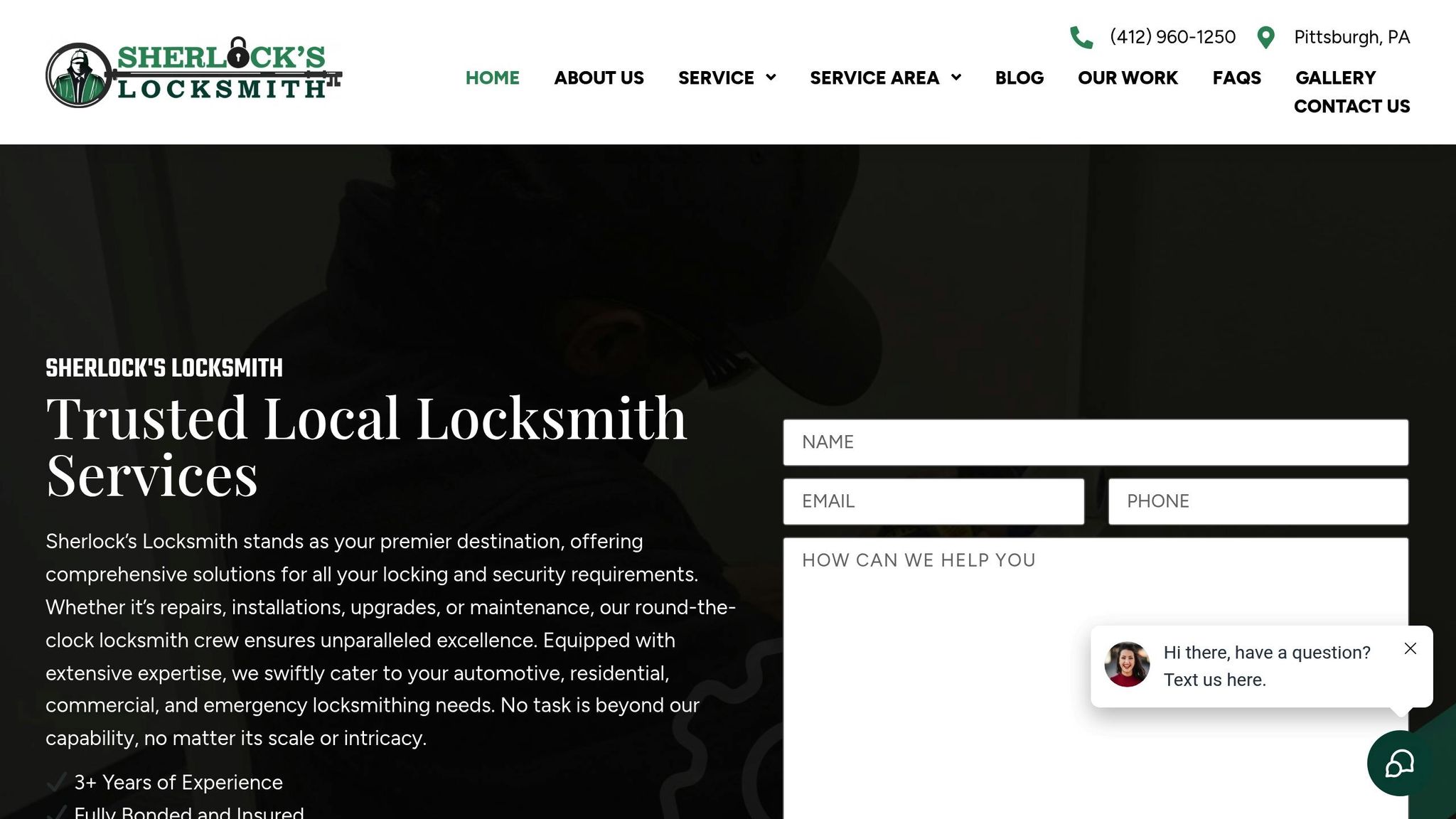
Sometimes, tackling a lock issue on your own just doesn’t cut it. That’s when turning to a professional locksmith can save you time, money, and a whole lot of frustration. Whether it’s an emergency or a complicated security upgrade, having an expert on your side makes all the difference.
Complete Locksmith Services
Sherlock’s Locksmith offers a wide range of services to handle just about any lock-related challenge in Pittsburgh, PA. Their residential services include everything from upgrading security systems and rekeying locks to installing advanced locks that help safeguard your home and loved ones. For business owners, their commercial locksmith services provide solutions like access control systems, master key setups, and even security consulting to keep your property protected 24/7.
When it comes to cars, their automotive locksmith services are a lifesaver, especially with today’s high-tech vehicle security systems. They handle key duplication, transponder programming, and ignition repairs – all tasks that require specialized tools and training. Plus, their 24/7 mobile emergency services ensure help is just a phone call away, no matter when or where you need it.
On top of that, Sherlock’s Locksmith stays ahead of the curve with electronic security solutions. They install keyless entry systems, biometric locks, and alarm systems designed to meet modern security needs. These advanced systems often need professional installation to work smoothly and maintain warranty coverage, making their expertise invaluable.
Why Choose Sherlock’s Locksmith
Sherlock’s Locksmith doesn’t just fix locks – they bring a level of expertise and convenience that’s hard to match. Their technicians are certified and trained to work on everything from traditional locks to the latest electronic security systems. This skill set is especially important for handling high-security locks, commercial-grade hardware, and complex automotive systems.
Their mobile service approach is another big advantage. Instead of dealing with the hassle of removing locks or towing your car to a shop, their team comes to you, fully equipped to handle repairs, installations, or emergencies on-site. This not only saves time but also reduces the risk of mistakes or incomplete fixes that can happen with DIY attempts.
Finally, Sherlock’s Locksmith prioritizes customer satisfaction by delivering reliable results backed by professional guarantees. When a certified locksmith does the job, you can rest easy knowing the work meets industry standards and won’t leave your security compromised. This kind of peace of mind is especially valuable when protecting your home, business, or vehicle from potential risks.
Conclusion
Deciding between DIY and professional lock repairs boils down to weighing costs, time, and risks. While tackling a lock issue yourself might seem like a budget-friendly option at first, mistakes can quickly pile up, leading to higher expenses and potential security risks. A seemingly simple fix can spiral into a costly repair if things go wrong.
Time is another key consideration. Sure, lubricating a sticky lock might take just a few minutes, but more complex tasks like rekeying or installing a deadbolt can consume hours of your time – if you don’t run into complications. A professional locksmith, on the other hand, can often complete the same job in a fraction of the time, thanks to their experience and tools. For example, a task that might take a DIYer four hours could take a locksmith only 20 minutes.
Then there’s the matter of risk. Attempting to repair high-security locks, electronic systems, or commercial-grade hardware without the right expertise can void warranties, create security vulnerabilities, or even cause irreversible damage. Professional locksmiths come equipped with the knowledge, tools, and experience to avoid these pitfalls, ensuring your security isn’t compromised.
DIY repairs are fine for straightforward tasks like cleaning or lubricating a lock. However, when it comes to issues like broken keys stuck in locks, malfunctioning smart locks, or any security system safeguarding your home or business, professional help becomes essential. As discussed earlier in this guide, knowing the limits of DIY is crucial.
If you’re in Pittsburgh, PA, and facing a lock issue, Sherlock’s Locksmith is a trusted option for professional assistance. Their certified technicians handle everything from emergency lockouts to advanced security installations. With 24/7 mobile service, they ensure you get prompt, reliable solutions for residential, commercial, or automotive needs – taking the stress and risk out of the equation.
When the stakes involve your security, investing in professional service isn’t just practical – it’s indispensable.
FAQs
What risks are involved in trying to repair a smart lock yourself?
Repairing a smart lock on your own can be risky. Without proper knowledge of the lock’s complex mechanisms, there’s a chance you could damage its internal components. This might leave the lock unusable or weaken its security features, which defeats the purpose of having a smart lock in the first place.
Another concern is safety. Using the wrong tools or techniques could lead to injuries like cuts or bruises. Beyond that, an improperly repaired lock may create security gaps, making it easier for someone to bypass and leaving your property vulnerable to intrusions.
To keep your lock working as intended and ensure your home stays secure, it’s a smart move to call a professional locksmith. They have the expertise and tools needed to handle repairs safely and effectively.
How do I know if a lock problem is something I can fix myself or if I need a professional locksmith?
Determining whether to fix a lock issue yourself or bring in a professional often comes down to the complexity of the problem. Simple issues, like a lock that’s a bit stiff or a screw that’s come loose, can usually be handled with basic tools and a little patience. On the other hand, more serious problems – such as a key that frequently gets stuck, a lock that feels wobbly, or visible damage to the mechanism – are better left to an expert. Trying to fix these on your own could potentially make things worse.
If you’re on the fence, think about the risks involved. A DIY attempt on a malfunctioning lock can sometimes lead to bigger, more expensive repairs. Professional locksmiths, like the team at Sherlock’s Locksmith, have the right tools and know-how to address lock issues efficiently while keeping your security intact. When in doubt, reaching out to a pro is usually the safer choice.
What are the long-term advantages of choosing a professional locksmith for complex lock repairs?
Hiring a professional locksmith for intricate lock repairs is a smart move if you want to ensure durable security and dependable results. Their skill set and access to advanced tools enable them to handle repairs with precision, keeping your locks intact and reducing the risk of break-ins or future issues.
On top of that, professional repairs can actually save you money in the long run by cutting down on repeated fixes or replacements. When you work with a certified locksmith, you’re not just securing your property – you’re also investing in long-lasting solutions that safeguard your home or business effectively for years. Plus, there’s the added comfort of knowing your security is being handled by an expert.



